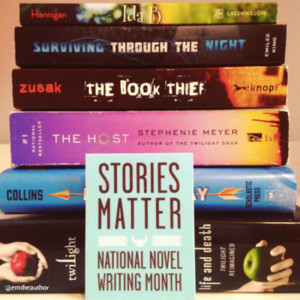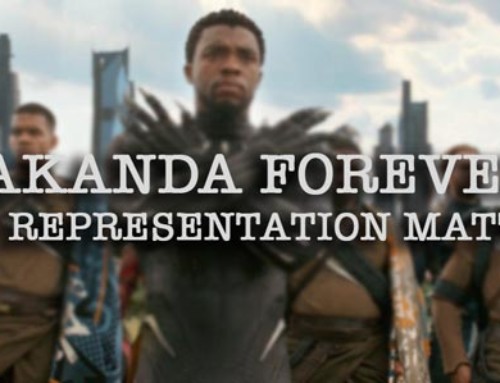A few months ago my heart was filled with anguished pride and empty finality as I walked out of the movie theater after seeing the final Hunger Games film. The Mockingjay pin secured to my chest thumped softly against me with every step, each thump yet another reminder: it was over. The franchise I’d read, followed, watched, fallen in love with and fought for was all over. After all these years, the war had been fought, the revolution won. It was time to go home.
After my play-by-play recount of the film to my dad, I collapsed against the couch and sighed, not able to accept the fact I’d never see another Hunger Games movie again for the first time. My dad sensed my mourning and asked, “Well, what’s next?”
Next? Next as in…what? I hadn’t even figured out how I was going to sleep that night with the movie on replay in my head, let alone made any future plans.
“You know, what’s the next franchise?” he asked when I didn’t answer. “What’s your next countdown?”
I was slightly appalled—the corpse wasn’t even cold yet, so to speak—but after I got over the initial shock of the question, my stomach settled into uneasiness. It’d been such a whirlwind for me the past few years, saying goodbye to some core franchises like Harry Potter, Twilight and, now, Hunger Games. I’m not a big fan of Divergent, have yet to jump on the John Green train, and the Percy Jackson movies were a bust.
What’s next?
That’s the beautiful part about being a fangirl—there’s always a next. While Hunger Games will leave a void in my nerd heart that will never be filled by anything else, there’s a Barnes and Noble full of unknown pages to bore into my soul, both old and new. There’s a Netflix bursting with entertainment to be addicted to. There is no shortage of fiction. It’s the one thing I know I can always rely on to be around, always, until the day I die.
So what’s next? As my pal Flynn Rider would say, that’s the good part, I guess: you get to go find a new dream. Or book. Or fandom. You get to find something else to add to your inner library.
I think that’s beautiful. I think that’s amazing. And that makes me incredibly proud—and grateful—that I’m the type of person that identifies as a fangirl.
Taylor Swift is one of my favorite people on this planet, and once she said, “People haven’t always been there for me, but music always has.”
Just a slight edit: people haven’t always been there for me, but fiction always has. I think that’s part of the reason I became a writer. I think that’s part of the reason why a lot of writers become writers. We know what it’s like to be a reader, to have our life changed or impacted, to become a better person because of a work of fiction. We know the magic. And we want to pay it forward. We would give anything to have our fiction be the magic for someone else.
I think fiction is empowering. It’s powerful. Words are powerful, as history proves time and time again, which is why I’m such a big supporter of them. Words can save lives, and words can change them. Put those words into a story with humans that struggle, and you can get something infinitely more valuable out of it: empathy.
Empathy is the key to saving humanity. I really believe that. Empathy leads to compassion and understanding, to appreciation and connection. It links people together while giving insight and digging deeper into the individual, excavating, strengthening, and humanizing. And there’s no better way to practice empathy than by reading.
Because resonating with fiction is the purest form of empathy—feeling happy, sad, angry, irritated, excited, proud, embarrassed, nervous for and through characters on a page. Throwing the book and shouting in frustration over decisions that will never nor can ever affect you or even the world you live in. Crying over people that don’t even exist. That’s compassion. That’s feeling. And, I believe, that’s making you a slightly better person.
I’m a psychology major, and I’ve been taught that one of the best things you can do for someone struggling is to empathize. NOT sympathize. Empathy and sympathy are completely different things, and oftentimes sympathy is the worst thing you can do for someone (and as a person who has struggled in their life, I know firsthand how true that is). Sympathy is pity. Empathy is understanding. Sympathy drives people apart because of differences while empathy brings people together because of commonalities.
There is no feeling like knowing someone understands, especially when you’re low and lonely. Sometimes it feels as though no one on the planet understands you, that you’re doomed to be alone, to suffer in silence. I guarantee you aren’t. I guarantee if you look hard enough, you’ll find someone who understands almost exactly. Where can you find these people, you may ask?
Yep, you guessed it: fiction.
After all, Harry made it through a childhood of loss, neglectful abuse, and a legacy, expectation and name he didn’t ask for, and still managed to rise up, make lasting friendships and defeat Voldemort.
Katniss made it through years of holding up her household on her own while living under an oppressive tyrant, survived brutal circumstances that left countless physical and mental scars, lost her family, security and many parts of herself, and still led a revolution, faced her worst enemies and rebuilt a life for thousands of others and herself.
Bella made it through her parents divorce, a difficult move, loneliness and lack of belonging, and, later, dozens of near-death experiences while dealing with being the weakest link, and still managed to fight for her family and a place she finally truly belonged.
Peggy made it through WWII as a ranking female, losing friends and the love of her life to the horrors of war, only to return home and face heartbreak, isolation and discrimination, and still managed to break through gender roles, empower herself and make a difference in the world while holding true to her values.
Cath made it through a broken home, a spiraling twin and dad she didn’t know how to help, crippling anxiety, and freshman year of college away from home and ten thousand miles outside her comfort zone, and still survived college, helped her family, made new friends and built her confidence.
Even Flynn made it through life as an orphan, alone and unwanted, turning to crime as a means of living but only getting further and further into trouble and lost identity, and still helped save a stranger, turned his life around, and became someone he was happy with and proud of.
They made it.
And somehow that makes me think I will too.
#storiesmatter
